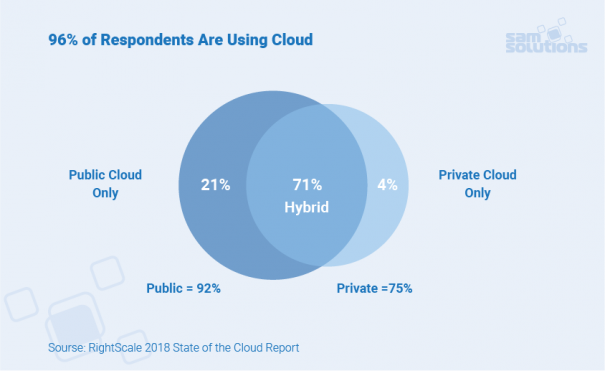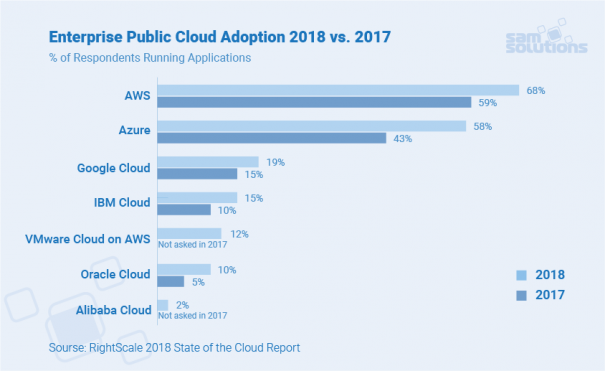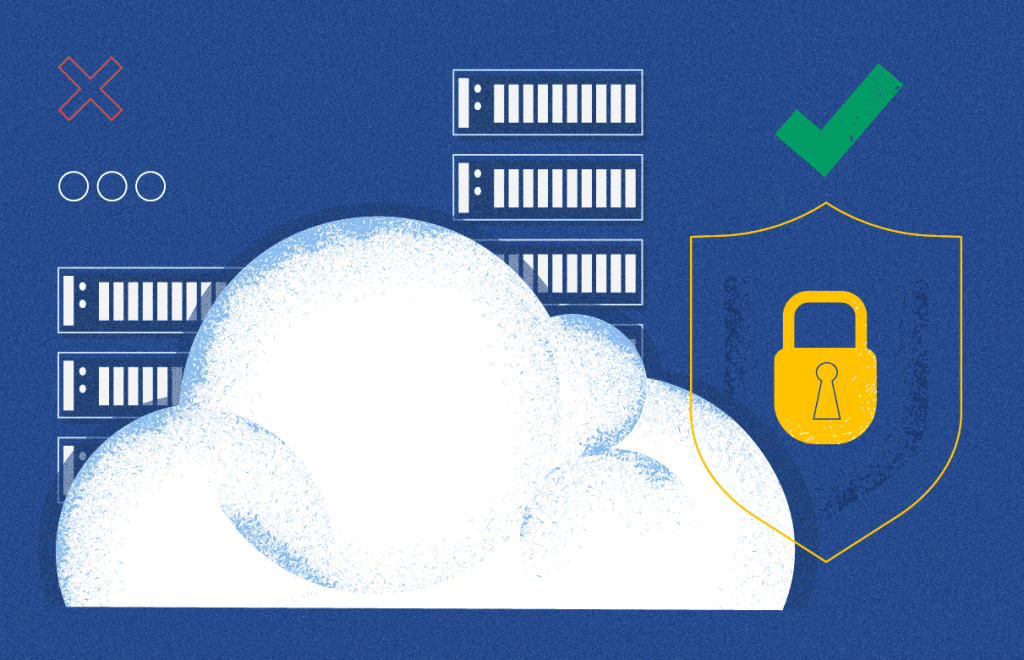Using cloud technologies has become a must for large businesses and startups. The process of selecting a proper cloud platform is complicated by the fact that there’s no common scheme for assessing providers and offerings, as all of them have specific features, and every organization has specific needs. In our post, we want to discuss the basic criteria you can use to help in choosing the right cloud platform and provide a list of platforms that are worth paying attention to.
Drive your digital transformation to the next level with our world-class cloud development services
Criteria for Selecting a Cloud Platform
The cloud market is crowded today. There are several important features that should be considered in order to understand which cloud computing platform you should choose. Figuratively, all the criteria can be divided into three groups.
Your Business Needs
The first step is to determine your business-specific needs. To do this, you should consider the following points:
- The type of data to store. Sensitive or non-sensitive information will directly define the type of platform to use.
- The number of devices to connect to your platform. Examine the size of your business and the scalability of the service. Remember also that the more people involved, the less secure your data will be.
- The budget. There are services that are free and those that are not, and their security levels differ. Small vendors are usually less expensive than global leaders.
Cloud Types
The choice of the cloud type depends on the above-mentioned needs.
Public clouds are more suitable for non-sensitive data storage, as they use a shared infrastructure and serve multiple customers. There are both free and pay-per-use options. This option is the most vulnerable to cyber-attacks.
Pros: flexibility; scalability; reasonable price; you don’t have to manage it yourself.
Cons: security issues; issues of compliance for certain industries (e.g. finance).
Private clouds are suitable for sensitive data storage (e.g. for the healthcare industry) as they use a proprietary infrastructure and serve just one customer. They work well for changing business models and unpredictable needs.
Pros: high security; scalability.
Cons: management (your own team should manage it); price (additional expenses for staffing, maintenance, virtualization, cloud software and tools).
Hybrid clouds combine the best features of the two above-mentioned options. They consist of several private and public clouds, and a company may shift its workloads between them. An on-premise private repository can be used for sensitive data and a public one — for less sensitive information. Hybrids are ideal for highly changeable workloads.
Pros: maximum flexibility; easier access for mobile and remote users; enhanced agility.
Cons: complex management due to complex infrastructure; higher cost; security (have some equal vulnerabilities in public clouds).

The hybrid cloud market is estimated to grow from $33 billion in 2016 to $97.6 billion by 2023.
Multi-clouds have become a new trend in 2018. This approach implies that a client chooses several providers and uses their platforms and environments for different purposes as a coherent system. This is a sound approach as soon as one service maybe not enough to comply with all of the needs of a large organization.
Cloud Features
When you’ve decided on the cloud type, check that the main cloud features satisfy your business requirements:
- Security
- Compliance
- Architecture
- Manageability
- Service levels
- Support
- Cost
As you see, all of these criteria are interdependent. If you want to understand how to choose the right cloud solution, you should study them as a system.
Best Cloud Platforms for 2018
Now, when you know what to consider when choosing a cloud provider, let’s take a look at the list of the most interesting offerings.

Among providers, there are undisputed top leaders globally: AWS, Microsoft Azure and Google.
These giants are most suitable for large enterprises. For smaller businesses and personal usage, there’s a wide choice of vendors.
Read also: Top 5 IoT Platforms 2017
SaM CloudBOX PaaS
CloudBOX (Build-Operate-eXtend) is a digital business Platform-as-a-Service (PaaS) developed by SaM Solutions that integrates the latest architectural patterns and open-source cloud frameworks to jump-start software development projects.
Combining the best capabilities of the cloud-in-a-box and a software factory, CloudBOX is presented as an out-of-the-box solution.
It is infrastructure-agnostic and cloud-neutral, which means it can be hosted on any cloud solution such as Azure, AWS, Google, as well as on-premises (VSphere or OpenStack), or as a hybrid deployment. The platform is polyglot, enabling companies to opt for a programming language that best suits project requirements. Also, it can be seamlessly integrated with various IoT, B2B and B2C solutions.
Due to the microservices-based architecture of the platform, teams can modernize legacy software without any forced downtime, make modifications into a specific functionality without impacting the operation of other features and develop standalone microservices independently.
CloudBOX is supplemented with a software factory that includes DevOps and automation tools for continuous development, application lifecycle management and testing.
The current technology stack includes polyglot runtime support, Spring Cloud Netflix-based microservices reference implementation, Spring-boot library and ELK-based monitoring.
Pros
- Flexibility and freedom to add, modify or scale any features
- High availability
- Efficient performance
- Security
- Customers may focus on important business features, rather than on technical issues of their implementation
To learn more about CloudBOX, contact our experts.
Rackspace

Rackspace is another giant of the cloud infrastructure. With multiple offices around the world, the company is based in the US and operates data centers in North America, Asia and Europe.
Rackspace delivers certified expertise and integrated managed services across public and private clouds. It offers solutions for both large enterprises and small businesses:
- Managed security services
- Email hosting
- Managed databases
- eCommerce solutions
- Website hosting
- Monitoring
- OS and application infrastructure layer support (including automated updates and patches)
The company partners with the leading technology providers, including Alibaba, AWS, Google, Microsoft, OpenStack, Oracle, SAP and VMware.
Pros
- Fair pricing (users can quickly estimate the cost of the environment for their particular situation using a calculator)
- Flexible server plans
- Consistent uptime
- Fanatical customer support 24x7x365 (phone, live chat, knowledgebase, tickets)
- Stability
Cons
- Several web management panels with different logins that can be confusing
Rackspace is an ideal option for mid-sized organizations. It offers all four types of clouds: public, private, hybrid, multi.
CloudSigma

CloudSigma is a Swiss company specialized in cloud-based hosting with servers located in Switzerland and the US.
It offers a number of integrations, plugins and drivers, including those for OpenStack, Apache Libcloud, CoreOS and Ubuntu. It includes scheduled backup, auto-scaling, on-demand instances, elastic load balancing, virtual private cloud (VPC), and other features.
The company is able to easily scale up or down depending on your needs and can boast of fast-loading websites.
CloudSigma offers a very simple and transparent approach to pricing. You pay for your resource consumption in aggregate for your account. This means that you are free to build your infrastructure the way you like with totally unbundled resources and server sizing. You can also get a seven-day free trial.
Pros
- Flexibility (no fixed server sizes)
- Step-by-step wizard
- Plenty of tools and features
- Reliability and security
- Stable and fast networking
- Free customer support 24/7
Cons
- Limited connectivity options
- Pricing
CloudSigma is best suited for professionals and large organizations.
HostGator

HostGator is well-known in the web hosting world. Designed for WordPress, it is an ideal option for entrepreneurs and individuals and can be run on Windows and Linux platforms. It is also good for commercial websites.
HostGator offers flexible plans (shared web hosting plans, VPS hosting plans, dedicated server plans) that are cost-effective in various situations.
Users can experience faster load times due to low-density servers, premium hardware and multiple caching layers. They get detailed site statistics due to dashboard tools that provide a quick view of usage trends, page download speed, uptime, global reach, and more. With instant resource management, users can maintain their cloud-hosted sites without advanced coding knowledge or admin support.
The key benefit of HostGator is scalability. You can scale up or down without waiting for someone to process your order and without downtime while your webspace is reallocated.
Core features
- Integrated caching: pages load faster due to an optimal caching configuration.
- Intuitive dashboard: manage and track your site’s performance, gather information and keep an eye on all your important metrics.
- Resource management: monitor and allocate additional resources easily, as you have total control over them.
- Failover: if there is a hardware issue, your site can be switched to another server.
- Data mirroring: your data is automatically copied, and three mirrored copies are distributed across multiple devices to ensure safety and redundancy.
- cPanel: allows creating new email accounts, managing subdomains, and much more, all with one click.
Pros
- Simple to use
- A solid range of plans
- Plenty of discounts
- Unlimited bandwidth, disk space, and email accounts
- 99.99% uptime and a fast server
- 45-day full money-back guarantee
- Reliable 24/7 customer support via phone and online chat
Cons
- Only one domain with the basic plan
- The shared hosting is overloaded
- No email security protection
Cloudways

Cloud hosting providers can be divided into two groups: user-friendly services for small companies and individuals, and complex enterprise-level technologies.
Cloudways is somewhere in the middle. The company offers managed hosting powered by the top providers (Amazon, Google, DigitalOcean). Nevertheless, it is configured from an easy-to-use web console. Thus, this is a powerful but still user-friendly platform that combines high-end functionality with clear and simple operations.
The company has at least 25 data centers placed around the world (US, UK, Canada, Netherlands, Singapore).
Cloudways’ ThunderStack covers core performance needs: Nginx, Apache, Memcached, MySQL/MariaDB, Varnish Cache, PHP 7, PHP-FM and Redis. There’s one-click cloning, backup and restore, integrated Git and team collaboration tools for developers.
Prices start at a beginner-friendly $10 a month for one core, 1GB RAM, 25GB storage and 1TB of bandwidth.
Pros
- Free trial (no credit card required)
- You can install unlimited applications
- User-friendly control panel
- Automatic site backups
- Pay as you go
- Highly configurable
- Hosting solutions are also offered for other content management solutions such as WordPress, Moodle, Drupal, Joomla, Magento, and all PHP based websites
- Customer support (live chat, knowledgebase, tickets)
Cons
- You cannot use cPanel or Plesk
- Since this provider offers cloud-based hosting, you need some expertise to fully benefit from their services
Atlantic.Net

Atlantic.Net is based in Orlando, Florida and provides hosting solutions for individuals and companies. Its solutions comply with the Health Insurance Privacy and Portability Act (HIPAA) for hosting sensitive medical data.
Atlantic.Net is not a big name, but the company offers rather competitive services in the field. With data centers in San Francisco, Dallas, Orlando, New York, Toronto and London, it offers a 100% network uptime service level agreement (SLA) and some advanced features: scalable servers, daily backup, RAID redundant storage, and guaranteed CPU cycles.
The company also claims its infrastructure is ready to serve complex scaling needs, deploying as and when needed. Its packages offer a selection of applications, including cPanel/WHM, LAMP, WordPress, Node.js and Docker.
You don’t have to sign a contract with Atlantic.Net. You pay for the services you request on a monthly basis.
Pros
- Live tech support for all accounts
- Flexible packages
- Choice of Linux, Windows, FreeBSD
Cons
- cPanel is charged extra
- Many services need a customized quote that is not included in the price packages
Conclusion
In this article, we’ve discussed the main factors you should consider in order to find the best provider that will match all of your business and technical requirements. We hope that the list of some of the more popular cloud hosting companies will be of use to you.
SaM Solutions helps companies get the most out of cloud technologies. Our in-depth expertise includes:
- Migration of a corporate solution from the current PaaS platform to another cloud platform.
- Development, testing and deployment of corporate solutions on any cloud platform.
- Moving desktop applications to a cloud.
We develop innovative cloud-based solutions for clients around the world
Our team of programmers deals with the following platforms: AWS Elastic Beanstalk, Microsoft Azure, IBM Bluemix, Oracle Cloud Platform, Red Hat OpenShift, Salesforce Heroku.
SaM Solutions offers projects that are relevant for companies of all sizes, from startups to large enterprises. Please, feel free to contact our specialists. They will take care of the cloud, giving you the freedom to concentrate on what is in the cloud instead.



















 The Latest 15 Information Technology Trends in 2024
The Latest 15 Information Technology Trends in 2024 Top 10 Embedded Software Development Tools
Top 10 Embedded Software Development Tools IaaS vs. PaaS vs. SaaS: What’s the Difference?
IaaS vs. PaaS vs. SaaS: What’s the Difference? 10 Examples of Predictive Analytics
10 Examples of Predictive Analytics












 Web App Development Cost in 2025 [Key Price Factors]
Web App Development Cost in 2025 [Key Price Factors] 13 Best React Development Tools in 2025
13 Best React Development Tools in 2025 Top 10 Mobile App Development Trends 2025
Top 10 Mobile App Development Trends 2025 Top IoT Industry Trends in 2025
Top IoT Industry Trends in 2025 Java Web App Security: Everything You Need to Know
Java Web App Security: Everything You Need to Know
Way cool! Some very valid points! I appreciate you writing this post and the rest of the website is extremely good.
This weblog is magnificent i really like reading your posts.
Stay up the good work! You understand, lots of persons are searching around for info about cloud platform, you can aid them greatly.
I never found any interesting article like yours.
It is pretty worth enough for me. In my opinion, if all site owners and bloggers made good content as you did, the net will be much more useful than ever before.
This post is in fact a fastidious one it assists new net visitors, who are wishing in favor of blogging.
I like meeting utile information, this post has got me even more info!
Thanks for any other great post. Where else may just anyone get that kind of information in such an ideal means of writing?
I have a presentation next week, and I’m on the search for such info.
Thanks for some other informative blog. Where else may I get that type of information written in such a perfect approach? I’ve a challenge that I am simply now operating on, and I’ve been on the glance out for such information.
You got a very good website, Glad I noticed it through yahoo.
I love your tips to consider what data you need to store as well as your budget. Budget is one of the most important things in my opinion because you can’t really spend more than you have on a cloud service platform. We are considering which one to work with, and we haven’t started our budget plan yet, so we’ll have to start doing that. This will help us see exactly which options we can and can’t go with from the start.
Your blog is very nice…. thanks for sharing your information…